Mexico’s neighborhood stores (tienditas) have deep roots in their communities, where they often offer local products at accessible prices. But many are at risk of disappearing, as rising inflation, low sales and extortion could lead to their permanent closure, according to a National Alliance of Small Businesses (ANPEC) survey published on Wednesday.
Over 2,300 merchants, mostly women, heads of households and entrepreneurs, were interviewed as part of ANPEC’s Pulse of the Neighborhood Store 2025 survey. Of those surveyed, 77% said they were concerned about the risk of permanent closure and 68% said they’d had to close temporarily, either for a weekday or for a few hours, just to survive.

Many participants blamed low sales on rising inflation, saying that only one in 10 customers can afford all 24 essential pantry items in the basic food basket, or canasta básica.
Some also said extortion was a major issue, with four in 10 small shops having experienced the crime, either via telephone or by local gangs.
“Extortion is present in almost all commercial activities, from remote neighborhoods to urban areas with greater consumer spending,” ANPEC President Cuauhtémoc Rivera said.
Participants reported selling products at a loss or switching to lower-cost products to stay in business.
The economic pressure has led three in 10 businesses to stop paying for basic services, such as water or property taxes, according to the survey.
“Commerce is experiencing a paradox: the stores are open, but the refrigerators are empty,” said Rivera. “Purchasing power has been shattered, and food inflation dictates every survival decision.”
As soaring inflation has forced consumers to reduce spending, 75% of store owners surveyed said they have lost customers due to them looking for cheaper alternatives.
Eight in 10 small merchants surveyed offer groceries, and 62% businesses were less than 10 years old, with around half operating from home. In addition, around 32% of the shops emerged out of necessity, due to unemployment or layoffs, while 48% were created out of entrepreneurship.
Are 22,000 Oxxos in the country a blessing or a curse? A perspective from our CEO
Many of the small shops are widely considered the “fabric of the neighborhood,” according to Rivera.
Most participants — around 90% — said they had not received any digital training and many had no payment terminal or other way to receive funds electronically. However, 72% expressed a willingness to innovate but were unsure how to start. ANPEC said the numbers highlight the need for greater training, as well as national policies that support small businesses and help them grow.
“Giving up is not an option, but resisting requires increasingly more effort,” stressed Rivera.
“This resilience is painful. The small shops endure, not for profit, but out of commitment. They sell at a loss, endure without support, and continue out of pride.”
With reports from El Economista
